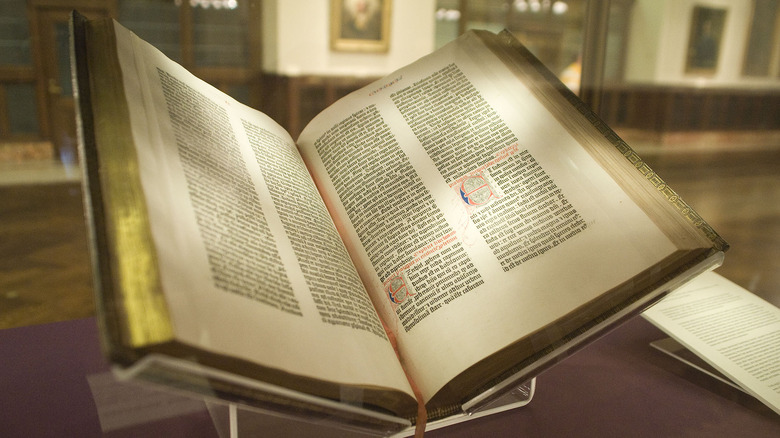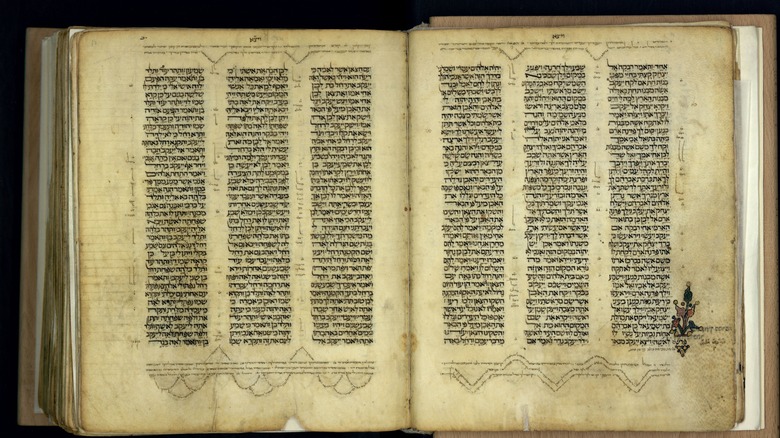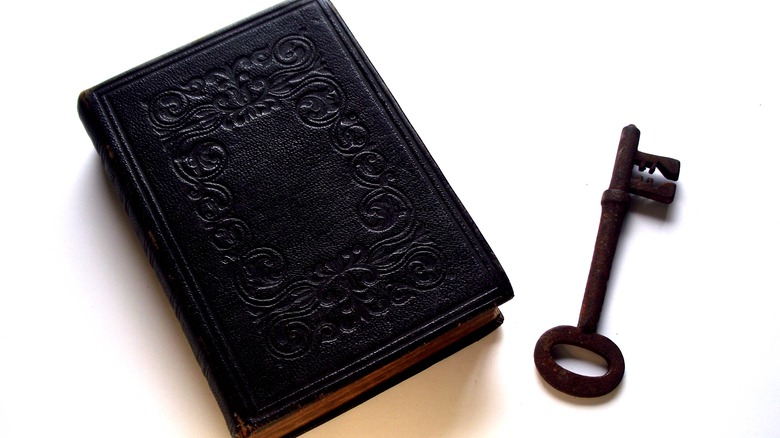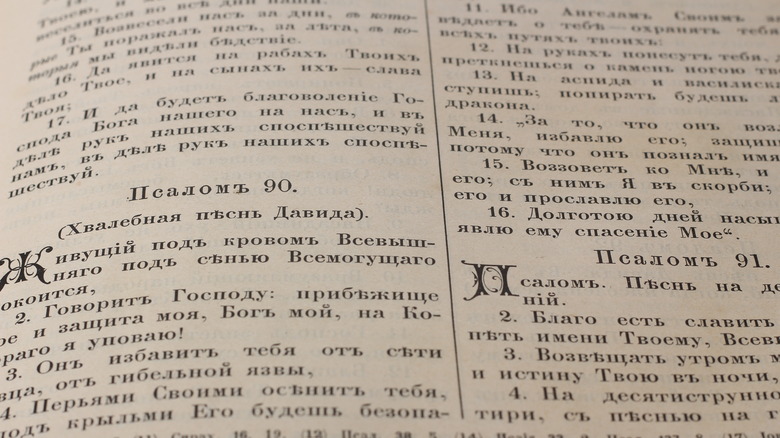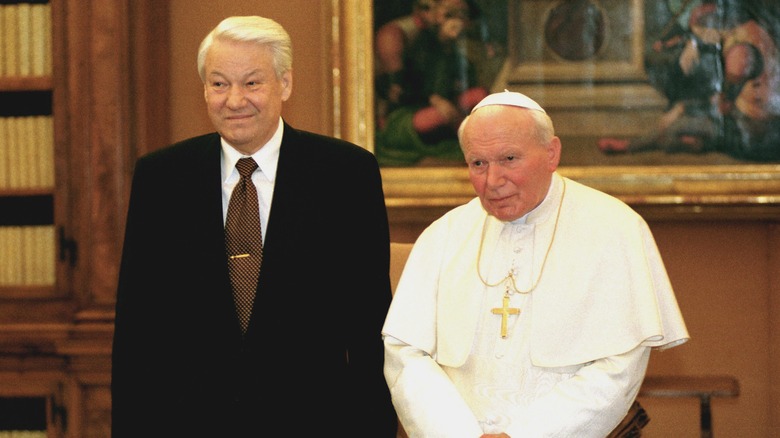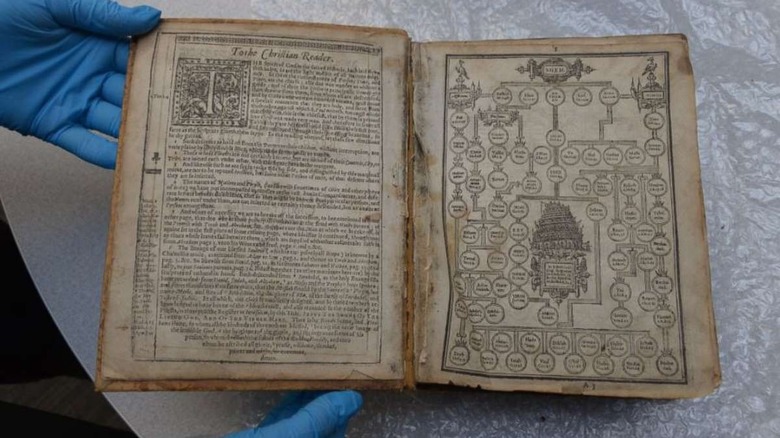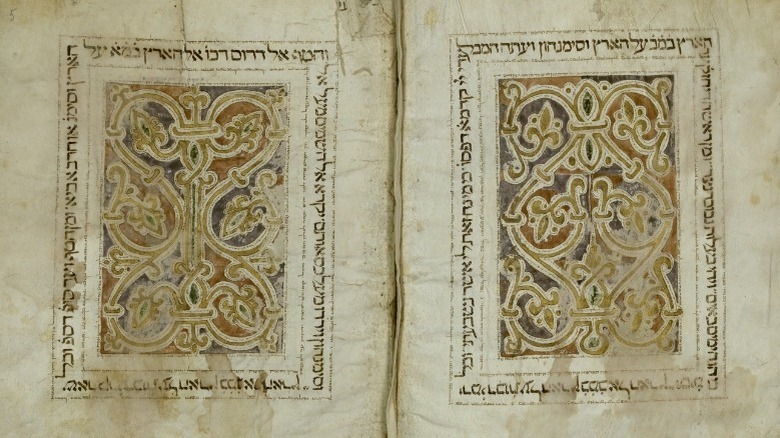The Crazy History Of Bible Smuggling
Bible smuggling has been around for hundreds of years in one form or another. It means exactly what it sounds like: smuggling Bibles between countries, mainly for reasons of religious intolerance or religious freedom. People who have the freedom to believe what they want usually want that for others as well, especially if they can sway them over to their way of thinking in the process.
During the Cold War, for example, thousands of Bibles were smuggled into the various countries that made up the Soviet Union. Several Protestant groups began the mission and continue it today. Now, Bibles are placed on flash drives, slipped into balloons, and floated over the border into North Korea. Though most modern Bible smuggling began under communism, Bibles have been smuggled throughout history under a variety of regimes. Notably, Bibles were smuggled into England during the 1550s, and into Israel from Syria in the 1990s, according to Haaretz.
Other than simply spreading their religious message, these Bibles seek to show people that they are not alone, that there are others out there who seek to make sure they are receiving knowledge other than what they're told by their government. Bible smugglers have undertaken dangerous journeys for years to get this message across to people who they believe need it most. They have been beaten, jailed, and shot, and yet several missions and organizations continue their work today.
What is Bible smuggling?
Bible smuggling began in the modern era because communist countries severely restricted access to religious literature like Bibles and violated their citizens' religious rights. It has grown to include other isolationist countries such as North Korea (a government that claims to be communist). Though it varied by country, repression of religion by necessity meant repressing religious material.
According to the Hungarian Review, the smuggling was mostly run by private Protestant groups from around the world, although there was one prominent Catholic organization called Russia Cristiana. This kind of Bible smuggling focused on working with other countries against communism. Broad knowledge of the practice is hard to come by, since very few studies have been done on the collaborative, inclusive nature of the work, though some of the people who participated went on to write memoirs. Even then, the smugglers had little data of their work, and it has been claimed that it wasn't necessary.
Meanwhile, communist countries worked to discredit Bible smugglers, claiming they were trying to overthrow the Soviets. Bible smuggling in eastern Europe faded after the fall of the Soviet Union. However, one former smuggler, Reverend David Hathaway, continues to work in eastern Europe, and says he's been successful.
Brother Andrew and the Cold War
Bible smuggling was a smaller element of Western anti-Communism efforts. Andrew van der Bijl, known as Brother Andrew, was a Dutch factory worker who began the practice of smuggling Bibles during the Cold War, in 1955.
Brother Andrew joined the Worldwide Evangelism Crusade in 1953 and heard about the lack of Bibles in Russia. He then attended Christian meetings in communist Prague and got himself banned from the city, writes Hungarian Review. By 1956, he was ministering to refugees in eastern Europe. He founded the organization Open Doors to support his work there. The KBG at one point infiltrated the organization, but over time it expanded, now supporting families of martyrs and seminary students, and providing printing presses where needed.
Many others followed in Brother Andrew's footsteps, working from the Scandinavian countries, the United States, Switzerland, West Germany, and the Netherlands. The groups worked to divide tasks among translators, producers, and the smugglers themselves, writes "Transnational Anti-Communism and the Cold War."
The Eastern European Mission
In 1961, several couples moved from Texas to Vienna, Austria and started the Eastern European Mission, which worked to smuggle Bibles into the Soviet Union. The Eastern European Mission printed the New Testament in several eastern European languages and smuggled them over borders in increasingly creative ways. The New Testament was printed small, with no writing on the cover, so it could be mistaken for a packet of cigarettes and hidden in a shirt pocket. Bibles were stored in spare tires, in jeans, in a farmer's hay in his barn. One man had his Bible thrown out a train window by a guard, but it was returned to him unexpectedly two years later. The children who found it by the tracks apologized, saying they had written out their own copies before sending it back.
Eastern Europeans helped smuggle at the time, and are now taking up leadership roles in the mission (via Christian Chronicle). Fifty years on, the mission produces Bibles for schools in Ukraine and Russia. The curriculum, which is in English, covers Christian ethics. The mission even sponsors competitions where Ukrainian school children compete in Bible knowledge and win prizes. The Eastern European Mission currently prints in over 20 languages and supplies Bibles to summer youth groups in Ukraine.
Door of Hope International
Door of Hope International (begun under the name Evangelism to Communist Lands), an organization now based in California, smuggled Bibles into the Soviet Union in the 1970s. They opened as an organization in 1972, after founder Haralan Popov spent over 13 years in Bulgarian prison for being a Christian, writes Door of Hope International. Popov was later the first person to broadcast the gospel in Bulgarian.
After moving to America and opening Door of Hope International, Popov began several projects to print and distribute Bibles in the Soviet Union, Romania, Bulgaria, and Czechoslovakia. During the 1980 Olympics, held in Moscow, Door of Hope International printed and delivered 500,000 Russian New Testaments, hidden by a redesigned cover which showed the Olympic torch.
Door of Hope International assisted the U.S. government in the 1970s to fight against religious oppression behind the Iron Curtain. Along with Bibles, couriers also smuggled sponsorship invitation documents across borders to families. Two of those families stormed the American embassy in Moscow, becoming known as the Siberian Seven, and later immigrated to the U.S.
Underground Evangelism
Underground Evangelism, a prominent U.S. Protestant organization, was originally founded in 1960 by L. Joe Bass with his wife Lois after their promise to help pastors in Yugoslavia a year earlier. According to the Hungarian Review, they were considered one of the most dangerous anti-Soviet organizations by the KGB.
The organization first provided those Yugoslavian pastors with $30 per month and the Bibles they could send. Their activities were based on the Centre for Study of Religion and Communism (later called Keston College), with whom they were collaborating. Underground Evangelism recruited from English churches. Volunteers spent summers camping in Bulgaria and smuggled Bibles over nearby borders. Secrecy was maintained among the smugglers, so that if one were caught, they couldn't inform on the others. The smugglers didn't even know the organization that ran the smuggling in the first place.
Reverend David Hathaway was recruited as a Bible smuggler and began his work in 1964 by posing as a religiously-inspired tour guide with a modified tour bus. He smuggled from 1964 to 1972, when he was caught on the Czechoslovak border. He continuously said he didn't know how the religious materials got into his bus but was held for months. Hathaway was eventually sentenced to two years, but his case was picked up by the English media, and he was released after serving several months (via Hungarian Review). Reverend David Hathaway later founded Eurovision Mission to Europe.
China's Project Pearl
During the evening of June 18, 1981, people crowded the coastline near Shantou, China as a 137-foot barge neared. People on the boat began releasing waterproof boxes into the sea even as the boat stopped a few dozen feet from shore, writes Mental Floss. This may have looked like a drug deal, but what was actually being handed off were Bibles. Recipients stayed as long as they could to collect all the boxes — each holding 90 Bibles in Chinese — as they floated to shore. Bibles were hidden in trees or handed off to other smugglers waiting nearby. Chinese authorities beat and jailed some Bible recipients and tossed Bible boxes back in the sea; local fishermen later sold those they picked up.
In 1979, the organization Open Doors learned that Chinese Christians had a limited number of Bibles. Open Doors contracted with a publisher for a secret printing job of one million Chinese Bibles. Ultimately, the work took two months and produced 232 tons of Bibles. The money to get the Bibles to China was raised by television ads and mail order solicitations. The Bibles ultimately traveled from California to the Philippines to China by June 1981.
The work, later dubbed Project Pearl, contributed to the creation of the Chinese Mission Church, writes City Church International. Bibles were so desired that when authorities threw some in a cesspool, Chinese Catholics quickly dragged them out and sprayed them with perfume so they could still be used.
Final Bible smuggling behind the Iron Curtain
For decades, Amish and Mennonite churches helped pay for Bibles to be smuggled in trucks into eastern Europe. However, in 1989, the Soviet Union was promised religious freedom, even pledging diplomatic ties with the Vatican. The years of sneaking over the Iron Curtain with forbidden religious materials were coming to an end.
AP News wrote that at least one Bible smuggler was glad reforms meant his 15-year-long job was done. ″I've been able to smuggle in $2.5 million in Scriptures since the middle 1970s,″ Ted Grevers said. ″The days of smuggling are over.″ (via AP News).
Grevers estimated he made 30 trips past the Iron Curtain with Bibles and medicine. He traveled through the Soviet Union to East Germany, Czechoslovakia, Hungary, Poland, Bulgaria, Romania, and Albania, though those last two countries were difficult to get into. He brought Bibles on barges, cars, and trains. Bibles could be mailed in the late 1980s, as well. Since the promise of religious freedom, Grevers was still working on bringing medicine to the Soviet Union.
Bible balloons into North Korea
Since the 1990s, missionaries and grassroots organizations have been smuggling Bibles into North Korea by way of putting them in helium balloons and floating them over the South Korean border. Today, they're more likely to be filled with flash drives, SD cards, and leaflets than bulky hardcover Bibles.
One smuggler is also bringing in hydrogen-fueled balloons measuring 40 feet around, filled with testimonials and Bibles. They are dropped in remote areas to mitigate the risk of their being shot down. Outside information, which is in high demand from citizens, has also been brought in by drones. On the other hand, small New Testaments are popular because they can be given in a handshake or otherwise quickly hidden in a strategic place.
Some Christians in North Korea have defected — some survive the trip and others don't. Defectors broadcast gospels in the border regions of North Korea, in the hopes of reaching someone out there who needs them. According to Fox News around one-fifth of North Korea's 25 million citizens owns a radio, so those broadcasts likely have an audience. Of the growing underground Christian movement, Todd Nettleton of Voice of Martyrs Radio said, "What those Christians are doing literally undermines the very veracity of the North Korean regime. If Jesus is Lord, then Kim Jong Un can't be."
Modern Bible competitions in the Middle East
The Bible smuggling organization Open Doors helps run Bible competitions on Facebook and other websites, which is essentially digital Bible smuggling. This participatory aspect encouraged Christians in the Middle East to read the Bible more closely, and therefore improve their relationship with God. Five questions are asked about different Bible chapters. Points are earned per answer, and small prizes are handed out. According to Open Doors USA, there are 5,000 people participating in the contests.
Other Christians distribute the Bible digitally by enticing social media viewers to click on a symbol which then displays a question about the Bible. Open Doors also helps with appeals directly to Arab youth which connect modern problems to the Bible.
Much of this has led to online discussion between atheists and Christians, and even Muslims and Christians. To think it all just started with some social media contests.
Bible smuggling and Bloody Mary
Though it may not seem like it, Bible smuggling is older than the Cold War. For example, several Protestant Christian leaders began sneaking English Bibles into England during the Catholic Mary I's reign in the 1550s.
Mary had over 300 Protestants burned at the stake throughout her 5-year reign (1553 to 1558), including the Archbishop of Canterbury, Thomas Cranmer (via History). According to Back to Jerusalem, Protestant leaders escaped to Switzerland. There, they created the Geneva Bible, which was in English.
Mary's persecution of the Protestant believers propelled the Geneva Bible far and wide in the underground Christian community in Switzerland and England. Smuggled into the country, the Geneva Bible was favored by John Knox (Scottish Reformation leader who founded Presbyterianism), John Bunyan (English Puritan who wrote "The Pilgrim's Progress"), and the Puritans who would eventually board the Mayflower. It also ended up being the basis for Oliver Cromwell's soldiers' pocket Bibles decades later.
Bible smugglers who have gotten caught
Bible smugglers have gotten caught during their work. These governments had and continue to have no interest in religious freedom and are against Western religions. Some who have gotten caught have endured lengthy prison sentences. Other punishments include beatings, being tortured, being bound, and being hit with freezing cold water.
According to CBN News, North Korea is extremely oppressive for Christians — where even saying "Jesus" could land someone in major trouble. Owning a Bible can give a sentence of up to 15 years in a hard labor camp. It is suspected that out of 300,000 Christians, 70,000 are in work camps. Others have simply been shot for their belief or actions. Their families are also punished. Tourists to North Korea are strongly advised to avoid any religious material. Jeffrey Fowle believed it was worth the risk. He hid a Bible in a men's restroom, planning that it would somehow reach the underground Christian community. Instead, he was imprisoned for three years.
The North Korean regime has been aware of the various methods for Bible smuggling since the 1990s and have stopped what they have the resources for. For example, anyone seen picking up Bibles brought in from balloons floated over the border is immediately arrested, writes Fox News. However, the government can't control everything anymore. Ben Gabriel, Initiative Director of Alpha Relief said, "North Korea no longer has an iron grip on the spread of information in the country."
Bibles smuggled into Israel
Centuries-old Hebrew Bibles were smuggled into Israel in the 1990s. Specifically, the rare Damascus Crowns, written from the 13th to the 15th century in either Spain or Italy, were smuggled from Syria by the Mossad in the 1990s, when the Syrian Jewish community left the country. Along the way, the Hebrew Bibles traveled from their place of origin to synagogues in Damascus. As of 2020, the Jerusalem District Court decided they should stay in the National Library in Jerusalem, saying it was, according to Haaretz: "for the benefit of the entire public, on behalf of future generations and to perpetuate the heritage of the Syrian Jewish community,"
The rabbi of the Syrian Jewish community, Rabbi Avraham Hamra, asked that they be returned to the community. The rabbi arrived in Israel in 1994 and had a hand in bringing the Bibles to the National Library in Jerusalem. Israel's Attorney General Avichai Mandelblit considered them public and cultural property for the people. The Association of Damascus Jewry in Israel also wanted the Bibles to stay where they've been: the National Library.
When the Hebrew Bibles were brought to the library for the first time, they were treated, conserved, and generally restored. At the time, Rabbi Hamra was told that the Israeli government would help him create an institution for the heritage of Syrian Jewry, but that hasn't come to pass.
